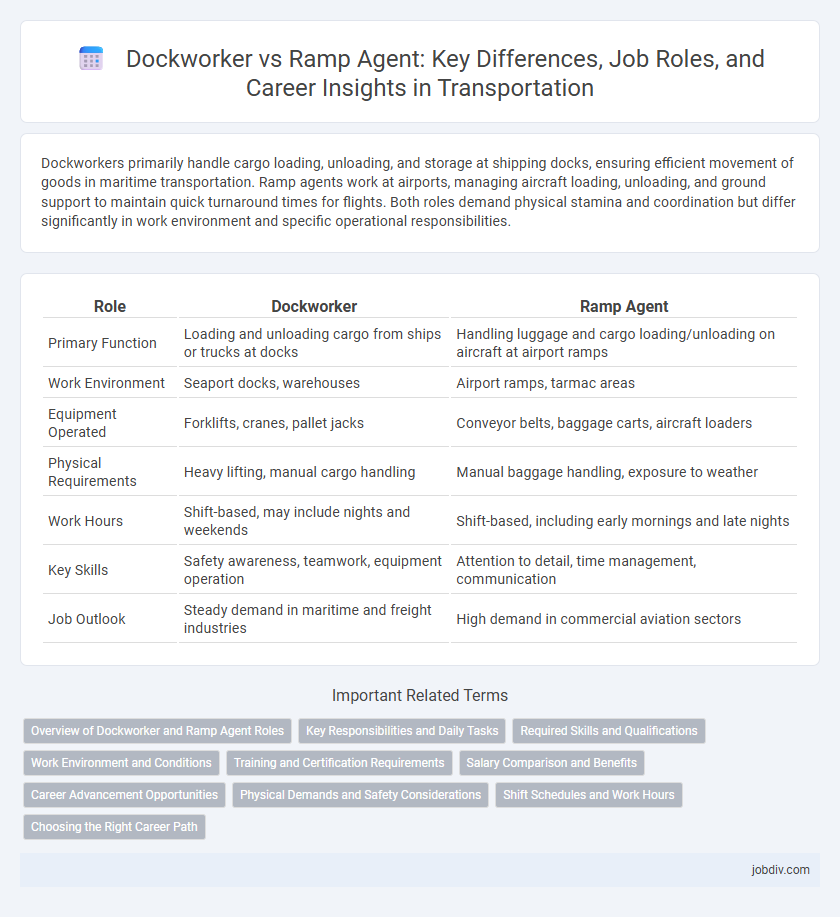Dockworkers primarily handle cargo loading, unloading, and storage at shipping docks, ensuring efficient movement of goods in maritime transportation. Ramp agents work at airports, managing aircraft loading, unloading, and ground support to maintain quick turnaround times for flights. Both roles demand physical stamina and coordination but differ significantly in work environment and specific operational responsibilities.
Table of Comparison
| Role | Dockworker | Ramp Agent |
|---|---|---|
| Primary Function | Loading and unloading cargo from ships or trucks at docks | Handling luggage and cargo loading/unloading on aircraft at airport ramps |
| Work Environment | Seaport docks, warehouses | Airport ramps, tarmac areas |
| Equipment Operated | Forklifts, cranes, pallet jacks | Conveyor belts, baggage carts, aircraft loaders |
| Physical Requirements | Heavy lifting, manual cargo handling | Manual baggage handling, exposure to weather |
| Work Hours | Shift-based, may include nights and weekends | Shift-based, including early mornings and late nights |
| Key Skills | Safety awareness, teamwork, equipment operation | Attention to detail, time management, communication |
| Job Outlook | Steady demand in maritime and freight industries | High demand in commercial aviation sectors |
Overview of Dockworker and Ramp Agent Roles
Dockworkers primarily handle the loading, unloading, and storage of cargo at shipping docks, ensuring efficient movement between ships and warehouses. Ramp agents coordinate aircraft ground operations, including baggage handling, aircraft marshaling, and refueling, facilitating timely departures and arrivals. Both roles are essential for smooth logistics and require physical endurance and adherence to safety protocols.
Key Responsibilities and Daily Tasks
Dockworkers primarily handle the loading and unloading of cargo, ensuring shipments are properly secured and organized in warehouses or on docks. Ramp agents focus on aircraft turnaround tasks, including guiding planes to gates, loading baggage, and performing safety checks on ground equipment. Both roles require coordination with logistics teams to maintain efficient airport operations and timely freight movement.
Required Skills and Qualifications
Dockworkers require physical strength, stamina, and knowledge of heavy machinery operation to load and unload cargo efficiently, alongside safety training and teamwork abilities. Ramp agents must possess strong organizational skills, proficiency with ground support equipment, and effective communication for coordinating aircraft loading and unloading processes. Both roles demand attention to detail and adherence to strict safety regulations within transportation and logistics operations.
Work Environment and Conditions
Dockworkers typically operate in outdoor port or warehouse settings, often exposed to varying weather conditions and heavy machinery noise, requiring physical stamina and safety gear. Ramp agents work primarily on airport tarmacs, facing fluctuating weather, tight schedules, and the need for quick, precise handling of aircraft cargo and luggage. Both roles demand physical endurance and adherence to strict safety protocols, but dockworkers usually experience more continuous heavy lifting, while ramp agents deal with rapid coordination in a highly regulated, fast-paced environment.
Training and Certification Requirements
Dockworkers require specialized training in cargo handling, safety protocols, and operation of heavy equipment, often necessitating certifications like OSHA safety training and forklift licenses. Ramp agents undergo focused training on aircraft ground support, including baggage handling, aircraft marshaling, and safety procedures, typically requiring certification through programs such as IATA ground operations or FAA safety standards. Both roles demand compliance with rigorous safety and operational standards to ensure efficient and secure transportation logistics.
Salary Comparison and Benefits
Dockworkers typically earn an average annual salary ranging from $40,000 to $60,000, with benefits including health insurance, retirement plans, and overtime pay. Ramp agents usually have a slightly lower salary range between $30,000 and $50,000 per year but gain access to travel benefits, flexible schedules, and performance bonuses. Both roles offer essential protections under labor unions, although dockworkers often receive more comprehensive healthcare packages due to the physically demanding nature of their work.
Career Advancement Opportunities
Dockworkers primarily handle cargo loading and unloading at ports, often progressing to supervisory roles such as dock supervisors or logistics coordinators through experience and certifications in maritime operations. Ramp agents perform aircraft ground handling duties, with career advancement possibilities including positions like lead ramp agent, ground operations supervisor, or roles in airport management, requiring expertise in safety protocols and airport regulations. Both careers can benefit from specialized training and union memberships, enhancing prospects for higher responsibilities and salary increases.
Physical Demands and Safety Considerations
Dockworkers face intense physical demands, including lifting heavy cargo, operating machinery, and working in variable weather conditions, which heightens the risk of musculoskeletal injuries and accidents. Ramp agents encounter rigorous tasks like guiding aircraft, loading baggage, and handling jet fuel, requiring constant alertness to prevent collisions and exposure to hazardous materials. Safety protocols for both roles emphasize proper ergonomics, use of personal protective equipment (PPE), and adherence to strict operational guidelines to minimize injury and ensure compliance with transportation regulations.
Shift Schedules and Work Hours
Dockworkers typically work in shifts that cover 8 to 12 hours, often including nights, weekends, and holidays to accommodate loading and unloading schedules at ports. Ramp agents usually have more structured shifts aligned with flight schedules, often working early mornings, evenings, and weekends, with shifts commonly lasting 8 to 10 hours. Both roles require flexibility, but dockworkers may face more variable hours due to shipping delays and cargo volumes.
Choosing the Right Career Path
Dockworkers specialize in loading and unloading cargo at ports, requiring physical strength and knowledge of logistics systems, making them ideal for those seeking hands-on roles in maritime transportation. Ramp agents focus on aircraft ground handling duties, including baggage loading and aircraft marshaling, suited for individuals interested in fast-paced airport operations and aviation safety. Evaluating personal skills, work environment preferences, and career advancement opportunities helps determine the best fit between dockworker and ramp agent roles in the transportation industry.
Dockworker vs Ramp Agent Infographic

 jobdiv.com
jobdiv.com